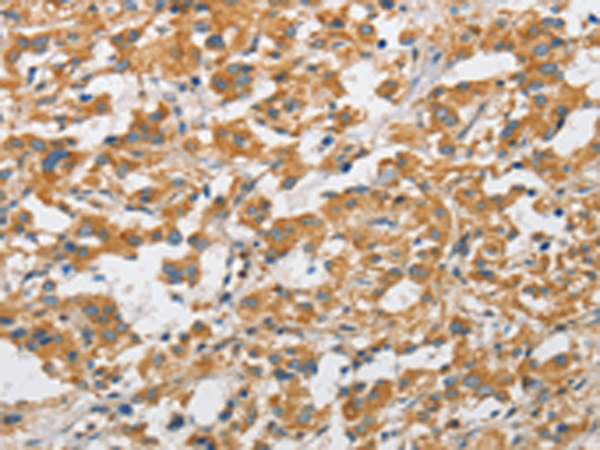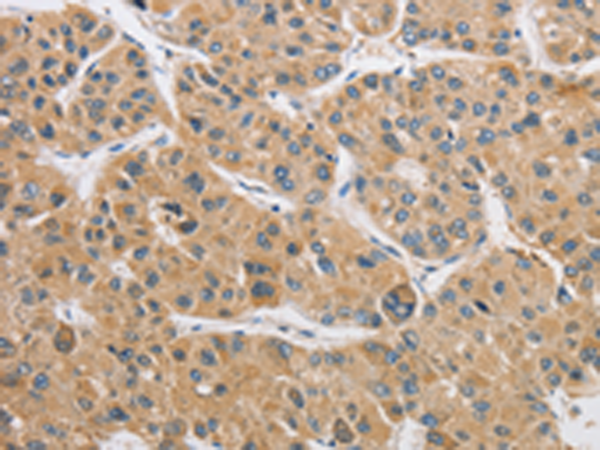


| WB | 咨询技术 | Human,Mouse,Rat |
| IF | 咨询技术 | Human,Mouse,Rat |
| IHC | 1/50-1/200 | Human,Mouse,Rat |
| ICC | 技术咨询 | Human,Mouse,Rat |
| FCM | 咨询技术 | Human,Mouse,Rat |
| Elisa | 1/1000-1/2000 | Human,Mouse,Rat |
| Aliases | BM046 |
| WB Predicted band size | 55 kDa |
| Host/Isotype | Rabbit IgG |
| Antibody Type | Primary antibody |
| Storage | Store at 4°C short term. Aliquot and store at -20°C long term. Avoid freeze/thaw cycles. |
| Species Reactivity | Human, Mouse, Rat |
| Immunogen | Fusion protein of human ARHGAP15 |
| Formulation | Purified antibody in PBS with 0.05% sodium azide and 50% glycerol. |
+ +
1. **"ARHGAP15 regulates endothelial barrier function by controlling neutrophil recruitment"**
*Authors: Müller WA, et al.*
摘要:研究利用ARHGAP15抗体探讨该蛋白在内皮细胞屏障中的作用,发现其通过调节RhoA活性抑制中性粒细胞迁移,维持血管通透性。
2. **"ARHGAP15 suppresses glioblastoma invasion by modulating Rho GTPase signaling"**
*Authors: Li Y, et al.*
摘要:通过ARHGAP15抗体进行免疫印迹分析,揭示其在胶质母细胞瘤中下调Rac1/Cdc42活性,抑制肿瘤细胞侵袭和转移。
3. **"Loss of ARHGAP15 promotes colorectal cancer metastasis via activating Wnt/β-catenin pathway"**
*Authors: Zhang H, et al.*
摘要:研究采用ARHGAP15抗体检测结直肠癌组织中的表达水平,发现其低表达通过激活Wnt通路促进癌细胞迁移,与患者不良预后相关。
4. **"ARHGAP15 deficiency enhances hematopoietic stem cell mobilization in mice"**
*Authors: Cancelas JA, et al.*
摘要:通过ARHGAP15敲除模型及抗体染色,证明该蛋白通过调控Rho激酶活性影响造血干细胞从骨髓向血液的动员过程。
The ARHGAP15 antibody is a research tool designed to detect and study the ARHGAP15 protein, a member of the Rho GTPase-activating protein (RhoGAP) family. ARHGAP15 functions as a negative regulator of Rho GTPases, particularly Rac1 and Cdc42. by enhancing their intrinsic GTPase activity to promote the inactive GDP-bound state. This regulation influences cytoskeletal dynamics, cell migration, and signaling pathways critical for immune responses, neuronal development, and cancer progression. ARHGAP15 is highly expressed in hematopoietic cells, including neutrophils and macrophages, where it modulates immune cell functions such as phagocytosis and chemotaxis. Dysregulation of ARHGAP15 has been implicated in inflammatory diseases, neurodegenerative disorders, and tumor metastasis.
The antibody enables researchers to investigate ARHGAP15's expression patterns, subcellular localization, and interactions through techniques like Western blotting, immunohistochemistry, and immunofluorescence. Its specificity and validation in experimental models (e.g., human, mouse) make it valuable for elucidating ARHGAP15's roles in physiological and pathological contexts. Recent studies highlight its potential as a biomarker or therapeutic target, particularly in cancers where Rho GTPase signaling is aberrant. However, functional diversity across tissues and species necessitates careful experimental design when using this reagent. Continued research with ARHGAP15 antibodies may uncover novel mechanisms underlying cell motility, immune regulation, and disease pathways.
×